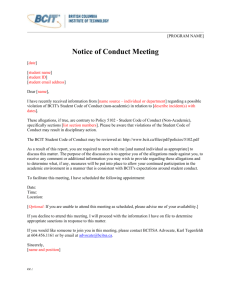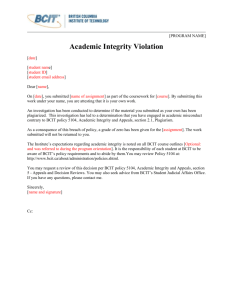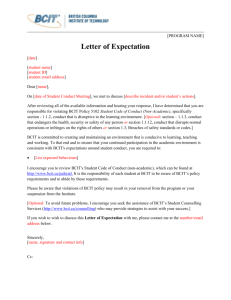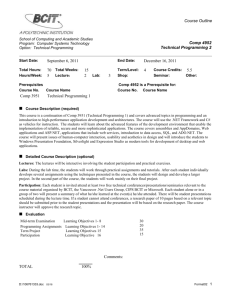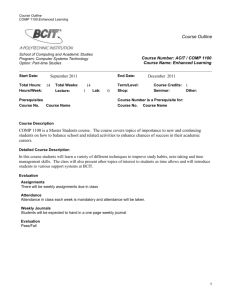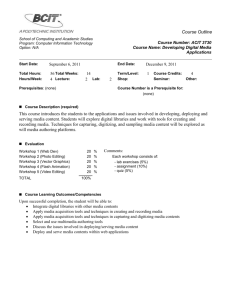Course Outline School of Computing and Academic Studies
advertisement
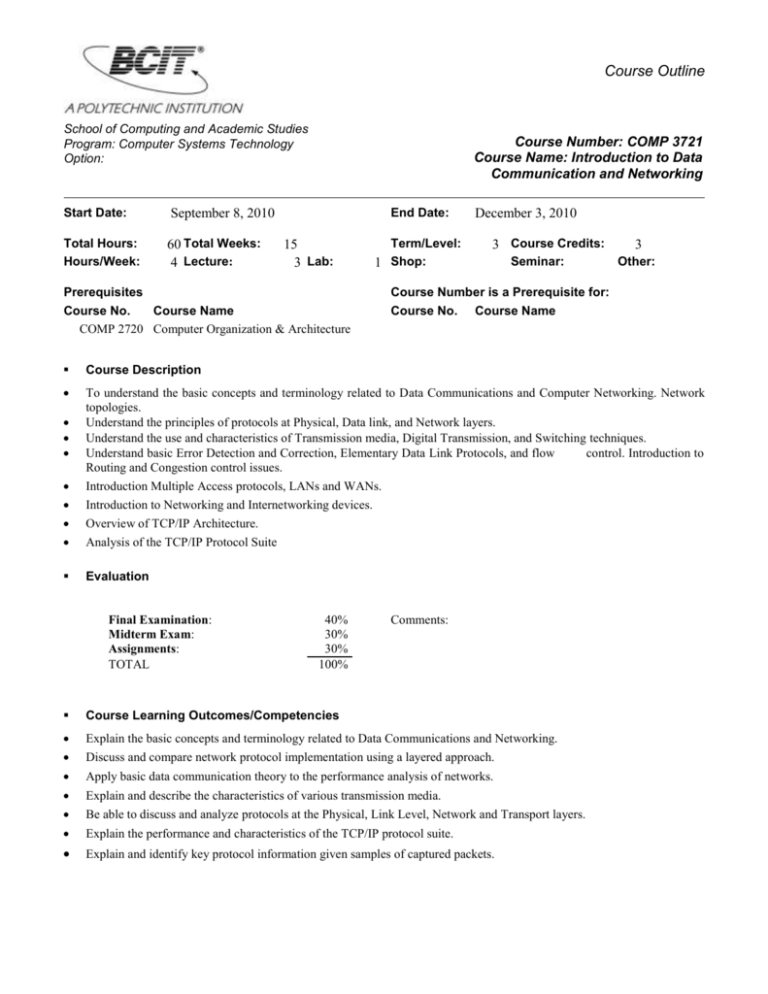
Course Outline School of Computing and Academic Studies Program: Computer Systems Technology Option: Start Date: September 8, 2010 Total Hours: Hours/Week: 60 Total Weeks: 4 Lecture: Course Number: COMP 3721 Course Name: Introduction to Data Communication and Networking End Date: 15 3 Lab: Term/Level: 1 Shop: Prerequisites Course No. Course Name COMP 2720 Computer Organization & Architecture December 3, 2010 3 Course Credits: Seminar: 3 Other: Course Number is a Prerequisite for: Course No. Course Name Course Description To understand the basic concepts and terminology related to Data Communications and Computer Networking. Network topologies. Understand the principles of protocols at Physical, Data link, and Network layers. Understand the use and characteristics of Transmission media, Digital Transmission, and Switching techniques. Understand basic Error Detection and Correction, Elementary Data Link Protocols, and flow control. Introduction to Routing and Congestion control issues. Introduction Multiple Access protocols, LANs and WANs. Introduction to Networking and Internetworking devices. Overview of TCP/IP Architecture. Analysis of the TCP/IP Protocol Suite Evaluation Final Examination: Midterm Exam: Assignments: TOTAL 40% 30% 30% 100% Comments: Course Learning Outcomes/Competencies Explain the basic concepts and terminology related to Data Communications and Networking. Discuss and compare network protocol implementation using a layered approach. Apply basic data communication theory to the performance analysis of networks. Explain and describe the characteristics of various transmission media. Be able to discuss and analyze protocols at the Physical, Link Level, Network and Transport layers. Explain the performance and characteristics of the TCP/IP protocol suite. Explain and identify key protocol information given samples of captured packets. Verification I verify that the content of this course outline is current. Aman Abdulla August 9, 2010 Authoring Instructor Date I verify that this course outline has been reviewed. Program Head/Chief Instructor Date I verify that this course outline complies with BCIT policy. Dean/Associate Dean Date Note: Should changes be required to the content of this course outline, students will be given reasonable notice. Instructor(s) Aman Abdulla Jason Harrison Assistant Instructor Office Location: Office Hrs.: Office Location: Office Hrs.: SW2, 323 TBA SW2, 125 TBA Learning Resources Required: Data Communications and Networking (4th Edition) Behrouz Forouzan McGraw-Hill Recommended: Computer Networks (Fourth Edition) Andrew S. Tanenbaum Prentice-Hall. Data And Computer Communications. William Stallings Prentice-Hall Office Phone: E-mail Address: Office Phone: E-mail Address: 604-432-8837 aabdulla@bcit.ca 604-453-4008 jason_harrison@bcit.ca Information for Students Assignments: Late assignments, lab reports or projects will not be accepted for marking. Assignments must be done on an individual basis unless otherwise specified by the instructor. Makeup Tests, Exams or Quizzes: There will be no makeup tests, exams or quizzes. If you miss a test, exam or quiz, you will receive zero marks. Exceptions may be made for documented medical reasons or extenuating circumstances. In such a case, it is the responsibility of the student to inform the instructor immediately. Ethics: BCIT assumes that all students attending the Institute will follow a high standard of ethics. Incidents of cheating or plagiarism may, therefore, result in a grade of zero for the assignment, quiz, test, exam, or project for all parties involved and/or expulsion from the course. Attendance: The attendance policy as outlined in the current BCIT Calendar will be enforced. The following statements are in accordance with the BCIT Policies 5101, 5102, 5103, and 5104, and their accompanying procedures. To review these policies and procedures, please refer to: www.bcit.ca/about/administration/policies.shtml Attendance/Illness: In case of illness or other unavoidable cause of absence, the student must communicate as soon as possible with his/her instructor or Program Head or Chief Instructor, indicating the reason for the absence. Prolonged illness of three or more consecutive days must have a BCIT medical certificate sent to the department. Excessive absence may result in failure or immediate withdrawal from the course or program. Please see Policy 5101 — Student Regulations, and accompanying procedures: http://www.bcit.ca/files/pdf/policies/5101.pdf Academic Misconduct: Violations of academic integrity, including dishonesty in assignments, examinations, or other academic performances are prohibited and will be handled in accordance with Policy 5104 — Academic Integrity and Appeals, and accompanying procedures: http://www.bcit.ca/files/pdf/policies/5104.pdf Attempts: Students must successfully complete a course within a maximum of three attempts at the course. Students with two attempts in a single course will be allowed to repeat the course only upon special written permission from the Associate Dean. Students who have not successfully completed a course within three attempts will not be eligible to graduate from their respective program. Accommodation: Any student who may require accommodation from BCIT because of a physical or mental disability should refer to BCIT’s Policy on Accommodation for Students with Disabilities (Policy #4501), and contact BCIT’s Disability Resource Centre (SW1-2300, 604-451-6963) at the earliest possible time. Requests for accommodation must be made to the Disability Resource Centre, and should not be made to a course instructor or Program area. Any student who needs special assistance in the event of a medical emergency or building evacuation (either because of a disability or for any other reason) should also promptly inform their course instructor(s) and the Disability Resource Centre of their personal circumstances. Assignment and Quiz Details There will be 4 or 5 assignments in this course. The assignments will cover the essentials of the various chapters. It is strongly suggested that you work on those problems, master them, and then try different scenarios on your own to reinforce the concepts. We will be discussing the assignment problems in the labs. Schedule Week of/ Number 1 Outcome/Material Covered Introduction and Basic Concepts o o o o o 2 o o o o o 3 Chapter 6 o o Analog Transmission Digital Transmission Time and Frequency Domains Composite Signals Digital-to-Digital Conversion Analog-to-Digital Conversion Digital-to-Analog Conversion Analog-to-Analog Conversion Chapters 3, 4, 5 Multiplexing o 4 Chapters 1, 2 Line Configuration and Transmission Mode Network Topology Categories of Networks and Internetworking Line Configuration, Network Topology and Transmission Mode The OSI Model Signals, Encoding and Modulation o o o Reference/ Reading Frequency Division Multiplexing Time-Division Multiplexing Spread Spectrum Digital Data Transmission and Transmission Media o o Guided and Unguided Media Transmission Media Impairments Chapter 7 Assignment Due Date Week of/ Number 5 Outcome/Material Covered 8 9 Chapter 9 Chapters 10, 11 Error Detection Codes Flow Control Stop-and-Wait Protocols Sliding Window Protocols LANs and Switching o o o o o o Due Date DTE-DCE Interface Modems DSL Fundamentals Asymmetric Digital Subscriber Line (ADSL) Very-High-Bit-Rate Digital Subscriber Line (VDSL) Cable TV for Data Transfer Error Handling and Data Link Control o o o o 7 Assignment Using Telephone and Cable Networks for Data Transmission o o o o o o 6 Reference/ Reading Chapters 12, 13 Multiple Access Protocols The IEEE 802 Standard for LANs Ethernet Circuit Switching Packet Switching Message Switching Networking and Internetworking Devices Chapter 15 o Repeaters, Bridges, Routers and Gateways o Distance Vector Routing o Link State Routing The TCP/IP Protocol Suite Chapter 20, 22, 23 o o o o o TCP/IP Protocol Overview Internetwork Protocol Addressing Issues and design User Datagram Protocol Transmission Control Protocol Note: It is expected that you have a working knowledge of solving algebraic equations and manipulating logarithms. It cannot be emphasized enough that the only way to assimilate the large number of concepts is to actually do the problems yourself. You will find it most beneficial to pre-read the chapters before lectures and in fact attend the lectures. You are required to read the specified chapters in your textbook as per the course outline. From time to time (as required), some notes be posted on the Data Comm Web server which you may access using the following URL: http://milliways.bcit.ca/c3721/
